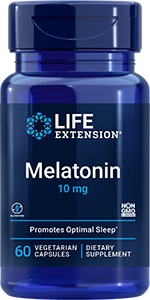- Science & Research
- Science News
- Newsletter
- 2005
- December 3

Newsletter
Newsletter
Study sheds light on how exercise reduces breast cancer risk
 | ||||||||||||||||||||||||||||||
| ||||||||||||||||||||||||||||||
| ||||||||||||||||||||||||||||||
| Life Extension Update Exclusive Study sheds light on how exercise reduces breast cancer risk Canadian researchers have discovered a possible explanation for exercise's positive effect on reducing breast cancer risk. In a report published in the December 1 2005 issue of the American Journal of Epidemiology http://aje.oxfordjournals.org, Dr. Julia Knight and her colleagues at the Samuel Lunenfeld Research Institute at Mount Sinai Hospital in Toronto, Ontario discovered that increased levels of melatonin may be behind exercise’s protective benefit. The findings of a number of previous studies suggest that melatonin may be protective against breast cancer. Obtaining regular exercise has also been shown to be protective against the disease, but the mechanism behind this phenomenon has not been agreed upon. Dr Knight’s team measured levels of a metabolite of melatonin in the urine of 213 women who collected overnight samples during winter and summer. The participants also took periodic light measurements and recorded exposures. Although none of the light variables were determined to be related to melatonin levels, the women’s exercise levels emerged as the most significant associated factor, with duration of exercise appearing to increase the amount of melatonin produced. “It is possible that the protective effect of exercise with respect to breast cancer may operate in part through an effect on melatonin,” the authors concluded. “If we know that increased melatonin production could be an underlying reason for the protective effects of physical activity against breast cancer, then there is great opportunity for the scientific community to build on this knowledge and help women understand what steps they can take to reduce their risk of developing the disease," Dr Knight stated. Sharon Wood, Executive Director of the Canadian Breast Cancer Foundation - Ontario Chapter who contributed to the funding for the research, commented, "Our focus on primary prevention research was initiated with the long-term goal of building knowledge about how to stop breast cancer before it starts. We are encouraged by the findings of Dr. Knight's work, which could provide momentum for lifestyle changes that could lead to a healthier population and potentially reduce the incidence of breast cancer." Light at night, regardless of duration or intensity, inhibits melatonin secretion and phase-shifts the circadian clock, possibly altering the cell growth rate that is regulated by the circadian rhythm (Travlos et al. 2001). Disruption of circadian rhythm is commonly observed among breast cancer patients (Mormont et al. 1997; Roenneberg et al. 2002) and contributes to cancer development and tumor progression. The circadian rhythm alone is a statistically significant predictor of survival time for breast cancer patients (Sephton et al. 2000). Melatonin differs from the classic antiestrogens such as tamoxifen in that it does not seem to bind to the estrogen receptor or interfere with the binding of estradiol to its receptor (Sanchez-Barcelo 2003). Melatonin does not cause side effects, such as those) caused by the conventional antiestrogen drug tamoxifen. Furthermore, when melatonin and tamoxifen are combined, synergistic benefits occur. Moreover, melatonin can increase the therapeutic efficacy of tamoxifen (Lissoni et al.1995) and biological therapies such as IL-2 (Lissoni et al. 1994). How melatonin interferes with estrogen signaling is unknown, though recent studies suggest that it acts through a cyclic adenosine monophosphate (cAMP)-independent signaling pathway (Torres-Farfan 2003). It has been proposed that melatonin suppresses the epidermal growth factor receptor (EGF-R) (Blask et al. 2002) and exerts its growth inhibitory effects by inducing differentiation (“normalizing” cancer cells) (Cos et al. 1996). Melatonin directly inhibits breast cancer cell proliferation (Ram et al. 2000) and boosts the production of immune components, including natural killer cells (NK cells) that have an ability to kill metastasized cancer cells. Since the 1960s, studies have shown that cancer patients often have decreased blood levels of coenzyme Q10 (Lockwood et al. 1995; Folkers 1996; Ren et al. 1997). In particular, breast cancer patients (with infiltrative ductal carcinoma) who underwent radical mastectomy were found to have significantly decreased tumor concentrations of CoQ10 compared to levels in normal surrounding tissues. Increased levels of reactive oxygen species may be involved in the consumption of CoQ10 (Portakal et al. 2000). These findings sparked interest in the compound as a potential anticancer agent (NCCAM 2002). Cellular and animal studies have found evidence that CoQ10 stimulates the immune system and can increase resistance to illness (Bliznakov et al. 1970; Hogenauer et al. 1981; NCCAM 2002). https://www.lifeextension.com/protocols/cancer/breast-cancer Featured Products Don’t forget: Super Sale pricing on Featured Products and all other Life Extension products now through January!
December 2005 issue now online! Reports Cover Story: Arkansas Governor Mike Huckabee: A new state of health for America, by Matt Sizing Controlling blood sugar with cinnamon and coffee berry, by Dave Tuttle Phenotypic nutrition: A new strategy for preventing metabolic syndrome, by Steven V. Joyal, MD Departments As we see it: Death by neglect, by William Faloon In the News: High blood sugar raises heart disease risk, Eating vegetables, fruit, cuts pancreatic cancer risk; Scientists unravel neuroprotective effects of fish oil; Curcumin lowers cholesterol, improves lipids; Folate cuts colon cancer risk; especially in smokers; “Accelerating Change” conference draws futurists to Stanford; Adding dietary fiber helps women stay slim December 2005 abstracts: Cinnamon, metabolic syndrome, bilberry, migraine https://www.lifeextension.com/magazine/mag2005/mag2005_12.htm | ||||||||||||||||||||||||||||||
| Questions? Comments? Send them to ddye@lifeextension.com or call 1-800-678-8989. For longer life,  Dayna Dye Sign up for Life Extension Update at https://mycart.lifeextension.com/subscribe.asp Help spread the good news about living longer and healthier. Forward this email to a friend! View previous issues of Life Extension Update in the Newsletter Archive. | ||||||||||||||||||||||||||||||
The latest news on aging, nutrition, and vitamins
Lab
Testing
How Life Extension lab testing works


